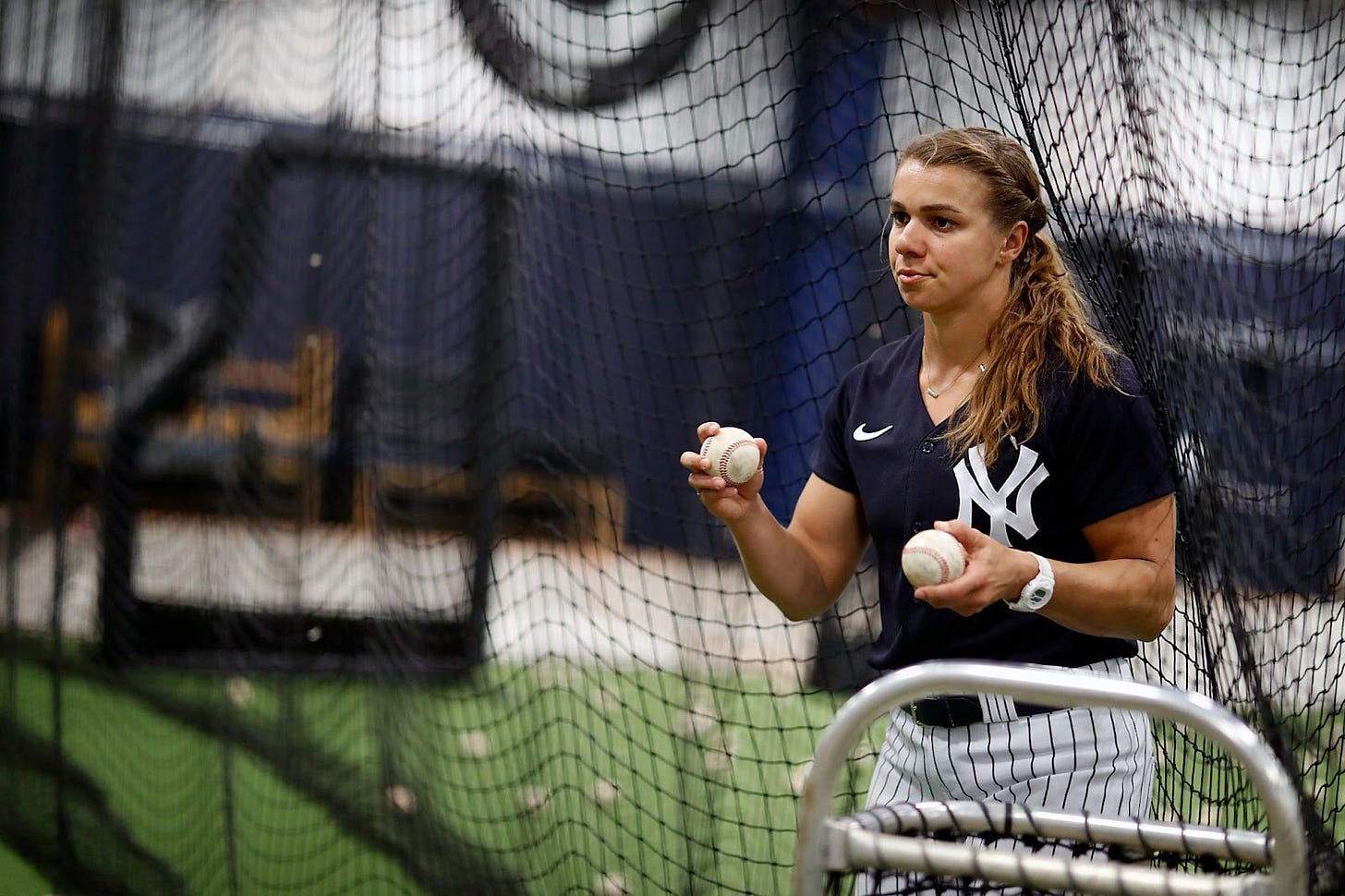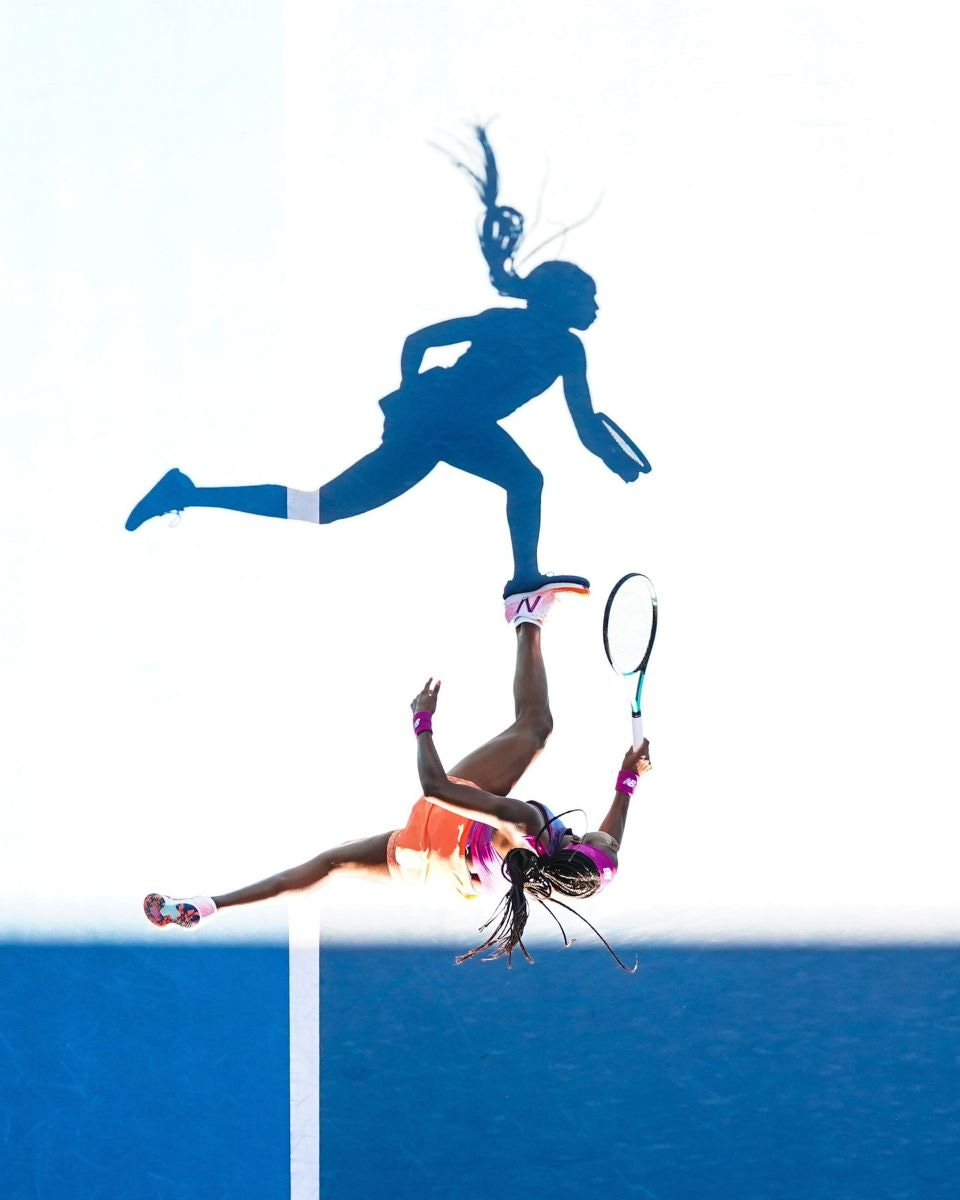Meet the First Female Manager in Baseball History
Rachel Balkovec knows that she’ll have to be more than a manager when she takes over the Yankees low Class A club next year.
Five years ago, Rachel Balkovec switched her name to the less-gendered “Rae” on her resumé so that baseball teams wouldn’t immediately toss it into the trash.
Four years ago, Rachel Balkovec changed in the women’s bathroom because she wasn’t allowed in a Minor League Baseball locker room.
Three years ago, Rachel Balkovec lived in Amsterdam sleeping on a mattress she pulled out of a dumpster, “broke as a joke,” as she put it.
This year, she’ll become the first female manager in professional baseball history.
How’s that for an origin story?
In early January, the Yankees announced that Balkovec would become the manager of the low Class A Tampa Tarpons—and the first female manager in professional baseball history. Her rise from graduate student to strength coach to history-making skipper might seem unlikely, but executives in the Yankees organization know better than to be surprised by Balkovec’s ascent. Kevin Reese, the team’s VP of player development, said as much during her introductory press conference. “‘Hey, was this tough? Was there a lot of debate?’” he asked. Not even a little. “Everybody was on board.”
When the Yankees approached Balkovec about the job, they explained why they thought she’d be a good fit. “You don’t have to be a defensive specialist to be a manager right now,” they explained to her. “Let’s open our minds to what a manager really is: a leader.”
And Rachel Balkovec is certainly that.
With a goal to one day work in the MLB, Balkovec played Division 1 softball for four years, earned two masters, learned to speak fluent Spanish, and studied eye recognition technology from one of the world’s experts (skills she uses to break down film). After years of rejections, Balkovec landed temporary positions with the Astros and Cardinals, serving on their strength and conditioning staff. Finally, the Yankees hired Balkovec as a full-time assistant in their farm system two years ago, and it didn’t take long before she won over the locker room. Once while tutoring top prospect Jasson Dominguez in English, Dominguez turned to her, and in words he was just learning to piece together asked, “How do you deal with the pressure of being a woman in baseball?”
“Whoa,” Balkovec thought. “This English class just got deep.”
Now, comes a new challenge—one for which she is uniquely qualified. “It’s my dream to be able to empower people,” Balkovec once explained. “Baseball is the vehicle for empowering other people.”
Of course, Balkovec will have more on her plate than the typical first-time manager. “I want to be a visible idea for young women,” she said. “I want to be a visible idea for dads that have daughters. I want to be out there. I have two jobs.”
It took Balkovec a few winding years to get to this point. Who knows how far she can go in the next five?
– Joe Levin
Binge Our Podcast Crushed
You might have heard some talk about steroids this week, after Barry Bonds and Roger Clemens failed to make it into the Baseball Hall of Fame. What’s the right way to deal with baseball’s steroid era? Should the players be demonized? How does that period still affect baseball today? We explored all those questions and more in our podcast series Crushed hosted by sportswriter Joan Niesen. All seven episodes are out now, wherever you listen to podcasts.
So Let It Be Written...
‘What Do I Want From This Crazy Thing Called Life?’
By Matthew Futterman • The New York Times
A look at the man behind Australian Open favorite Ashleigh Barty’s success, “mindset coach” Ben Crowe, who gets athletes to achieve peak performance by focusing their attention somewhere deeper than sports: “I try to get them to answer the questions: Who am I fundamentally? And, What do I want from this crazy thing called life?”
Francis Ngannou’s Miraculous Journey
By Tim Keown • ESPN
Francis Ngannou is the UFC’s heavyweight champion. This is his unbelievable backstory—detailing how he went from refugee to homeless to the octagon. An underdog story you’ll have to read to believe.
The Real Scandal of Varsity Blues
By Jon Wertheim • Sports Illustrated
Michael Center, the former Texas Longhorns men’s tennis coach, was fired in the wake of the “Varsity Blues” scandal about college applicants paying their way to spots onto sports teams. Center comes clean in this tell-all to SI, wondering why he’s out of a job while many administrators who encouraged the payments have come out clean.
Hall of Papi
This week, all the talk of the Baseball Hall of Fame was about who didn’t make it. That’s a shame, because the Hall of Fame is supposed to be a place that reflects the joy of baseball, not some self-important arbiter of morality. I’m of the opinion that we should look for reasons to let more people into the hall than trying to nitpick reasons to keep them out. The great Joe Posnaski wrote a column about a similar topic this week on his excellent JoeBlogs newsletter. If you haven’t read it, it’s worth your time.
But enough of that. I wanted to use this space to celebrate the wonder that is Cooperstown at its best. David Ortiz played the game with more flair than just about anybody, and his reaction to the news that he’ll be enshrined in the Hall is no different. From the outfit, to the Pedro Martinez cameo, to the emotion—if this video doesn’t give you chills, I don’t know what to tell you. Watch it here, and remember what baseball can mean at its best.
Congrats, Papi.
@barbour_scott
A Picture Is Worth a Thousand Words
What a picture of Coco Gauff during round one of the Australian Open.
Kevin Rushforth
Old School
Baseball Without Metaphor (2002)
By David Grann • The New York Times
Pair a great writer with a mercurial subject, and you’re bound to get gold. David Grann on Barry Bonds’ legendary 2002 season is as epic as you’d hope. Not only do you gain a little sympathy for the prickly slugger (''People who say they're not afraid of anything are liars. I’m afraid every time I go up there, not of being hit, but of failure.''), but there’s also a fascinating discussion of the role of the baseball player as a hero in American culture. Oh, and there’s this gem, which is even more spectacular 20 years later than it was back then. Grann finds then-Arizona Diamondbacks pitcher Curt Schilling watching Bonds hit batting practice before a game. ''Barry Bonds is a first-ballot Hall of Famer . . . but when he retires, he's still going to be the biggest ass who ever lived,” Schilling says. “Ask his teammates. Ask anyone on their team or in their clubhouse.”
Well, with two decades of hindsight, it’s clear that Bonds is merely the number two biggest ass who ever lived. And neither Schilling nor Bonds will make it to Cooperstown any time soon…
Last Word
“You either win, or you learn."
– Tom Brady









